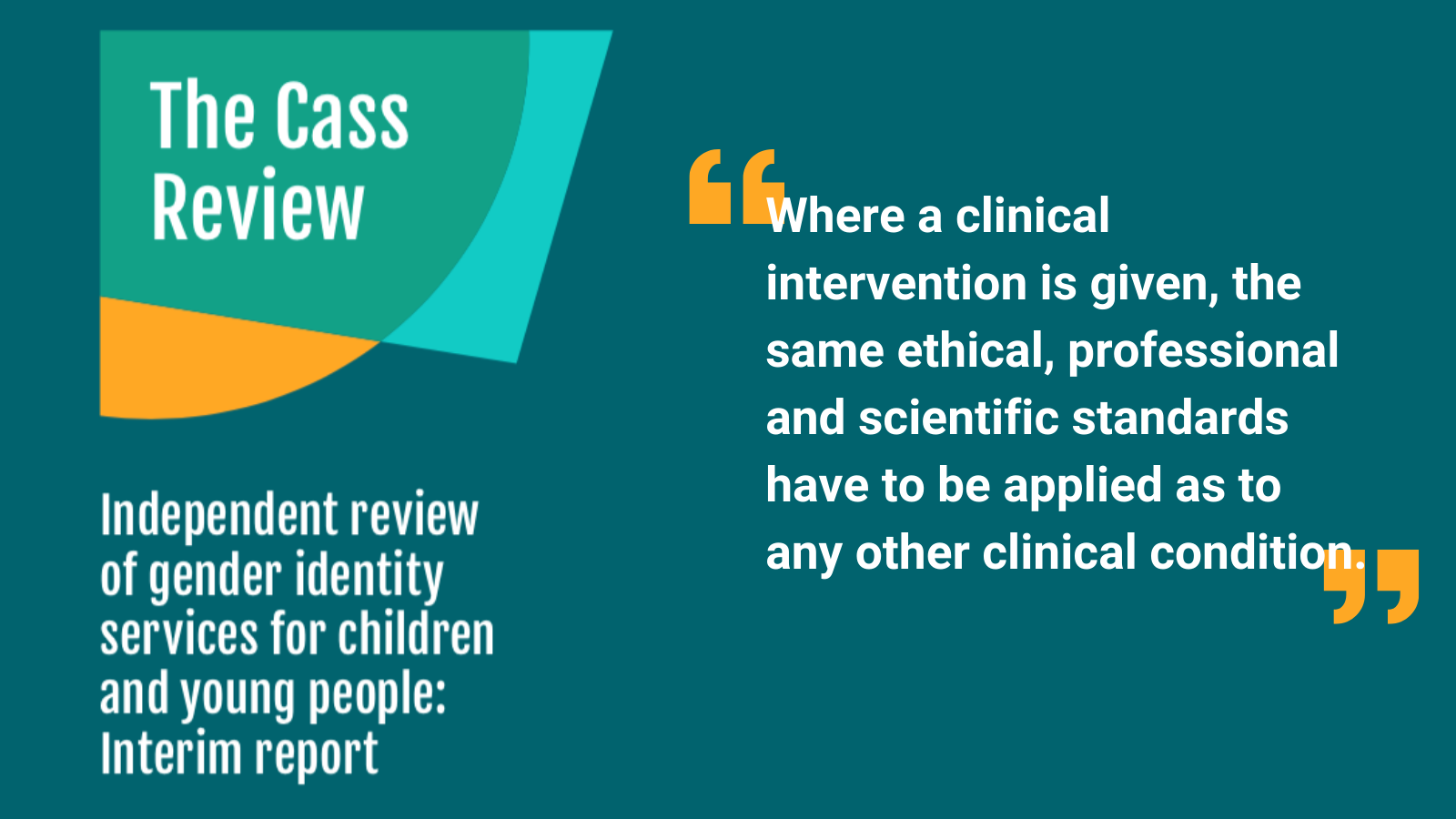The Cass Review’s interim report is out
The report shares initial conclusions that reflect many of the concerns raised by Sex Matters.

We called for the government to pause to consider the Cass Review before passing any legislation affecting the treatment of children and young people with gender dysphoria. It is abundantly clear from the interim report that politicians must wait for the review’s final findings before they take any action.
Diagnosis and treatment
At this stage in the investigations, Dr Cass OBE has drawn some initial conclusions:
- The presentation of gender-distressed children has changed, for reasons that have not been adequately explored.
- Gender dysphoria is not a unique presentation that should automatically and unquestioningly lead to clinical intervention; rather, it is a medical condition that needs clinical diagnosis.
“Where a clinical intervention is given, the same ethical, professional and scientific standards have to be applied as to any other clinical condition.”
- The treatment pathway for gender dysphoria has not developed in line with other conditions and treatment pathways.
- The evidence base for an affirmation-only model is severely lacking.
- Puberty blockers, rather than acting as a “pause button” allowing children time to explore their identity, seem to lock them into a medicalised treatment pathway.
“Data from both the Netherlands and the study conducted by GIDS demonstrated that almost all children and young people who are put on puberty blockers go on to sex hormone treatment (96.5% and 98% respectively).”
- There is too little evidence to make any recommendations on hormone treatment.
“Decisions need to be informed by long-term data [but] the NICE evidence review demonstrates the poor quality of these data, both nationally and internationally.”
- The best way to support young people experiencing gender distress has not been determined.
“From the point of entry to GIDS there appears to be predominantly an affirmative, non-exploratory approach, often driven by child and parent expectations and the extent of social transition that has developed due to the delay in service provision.”
Service provision
The report highlights deficiencies in current provision. The service is overwhelmed, which leads to delays, and is failing to gather evidence about comorbidities or long-term outcomes. This situation is exacerbated by an affirmation-only approach, as medics refer young patients to GIDS rather than keeping an open mind as they carry out a differential diagnosis and consider the right course of treatment. This leads to “diagnostic overshadowing”: comorbidities are overshadowed once a young person declares gender distress.
“Primary and secondary care staff have told us that they feel under pressure to adopt an unquestioning affirmative approach and that this is at odds with the standard process of clinical assessment and diagnosis that they have been trained to undertake in all other clinical encounters.”
Social engagement
Both within the report and in an introductory letter addressed to children and young people, Dr Cass seeks to calm the debate.
The reports notes that external pressures are harming clinical practice. Clinicians and others are afraid to speak up: the toxic nature of social engagement on this issue is stifling discussion.
Expectations are shaped by the wider culture:
“Social media […] can be seen to perpetuate unrealistic images of gender and set unhealthy expectations.”
and online sources influence behaviour: children are coached in what to say; GPs are pressured to prescribe.
“We have heard that some young people […] are advised not to admit to previous abuse or trauma, or uncertainty about their sexual orientation.”
“GPs have expressed concern about being pressurised to prescribe puberty blockers or feminising/masculinising hormones after these have been initiated by private providers.”
The report also confirms our view that banning conversion therapy in the way proposed in the government’s recent consultation paper would make a bad situation worse. It would become harder for parents, teachers, carers and medical professionals to have open discussions and find the right path for each individual child.
In our response to the government consultation, Sex Matters pointed out that requiring teachers to affirm a gender identity on pain of breaking the law forces them into an active intervention. The report states clearly that social transition is not a neutral act.
“It is important to view [social transition] as an active intervention because it may have significant effects on the child or young person in terms of their psychological functioning.”
Issues not explored in this interim report, but noted for future discussion, include:
- the role of schools and how they respond to gender-questioning children
- the interaction between sexuality and gender identity.
“We have heard from young lesbians who felt pressured to identify as transgender male.”
- the problems faced by detransitioners, who are living with the irreversible effects of transition but have no clear access to NHS services.
The report notes that there are areas in which significantly more work needs to be done: even terminology is not agreed on.
“A lack of a conceptual agreement about the meaning of gender dysphoria hampers research, as well as NHS clinical service provision.”
The definitions of dysphoria and conversion therapy are both unclear, and good law and public policy call for clarity.
Transgender Trend has written a response, saying:
“The report vindicates many of the points we have been making over the past six years regarding the right of children with gender-related distress to receive the same level of clinical care as any other child.”
The Spectator also commented, with James Kirkup writing:
“I hope the measured and independent analysis of the Cass Review is taken very seriously by everyone involved in debating this issue and making policy around it.”
